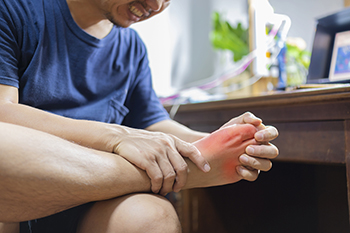
Gout, a form of arthritis caused by excess uric acid in the body, results in sudden and severe symptoms such as pain, redness, and swelling, often affecting the big toe. These gout symptoms can emerge rapidly and typically occur at night or early morning. Without treatment, gout can progress through three stages. Asymptomatic hyperuricemia is where uric acid crystals begin forming. Acute intermittent gout causes periodic symptoms. Chronic tophaceous gout happens when uric acid crystals accumulate, causing persistent inflammation and long-term complications like joint deformity and restricted movement. Gout attacks can vary in intensity and if left unmanaged, recurrent episodes can lead to severe complications. To prevent these outcomes and improve your quality of life, timely diagnosis and treatment are essential. If you are experiencing symptoms of gout, it is suggested that you add a podiatrist to your medical team to help manage this condition.
Gout is a painful condition that can be treated. If you are seeking treatment, contact Warren Levy, DPM from Armitage Podiatry Center. Our doctor will treat your foot and ankle needs.
What Is Gout?
Gout is a form of arthritis that is characterized by sudden, severe attacks of pain, redness, and tenderness in the joints. The condition usually affects the joint at the base of the big toe. A gout attack can occur at any random time, such as the middle of the night while you are asleep.
Symptoms
- Intense Joint Pain - Usually around the large joint of your big toe, and it most severe within the first four to twelve hours
- Lingering Discomfort - Joint discomfort may last from a few days to a few weeks
- Inflammation and Redness -Affected joints may become swollen, tender, warm and red
- Limited Range of Motion - May experience a decrease in joint mobility
Risk Factors
- Genetics - If family members have gout, you’re more likely to have it
- Medications - Diuretic medications can raise uric acid levels
- Gender/Age - Gout is more common in men until the age of 60. It is believed that estrogen protects women until that point
- Diet - Eating red meat and shellfish increases your risk
- Alcohol - Having more than two alcoholic drinks per day increases your risk
- Obesity - Obese people are at a higher risk for gout
Prior to visiting your podiatrist to receive treatment for gout, there are a few things you should do beforehand. If you have gout you should write down your symptoms--including when they started and how often you experience them, important medical information you may have, and any questions you may have. Writing down these three things will help your podiatrist in assessing your specific situation so that he or she may provide the best route of treatment for you.
If you have any questions, please feel free to contact our office located in Chicago, IL . We offer the newest diagnostic and treatment technologies for all your foot care needs.
